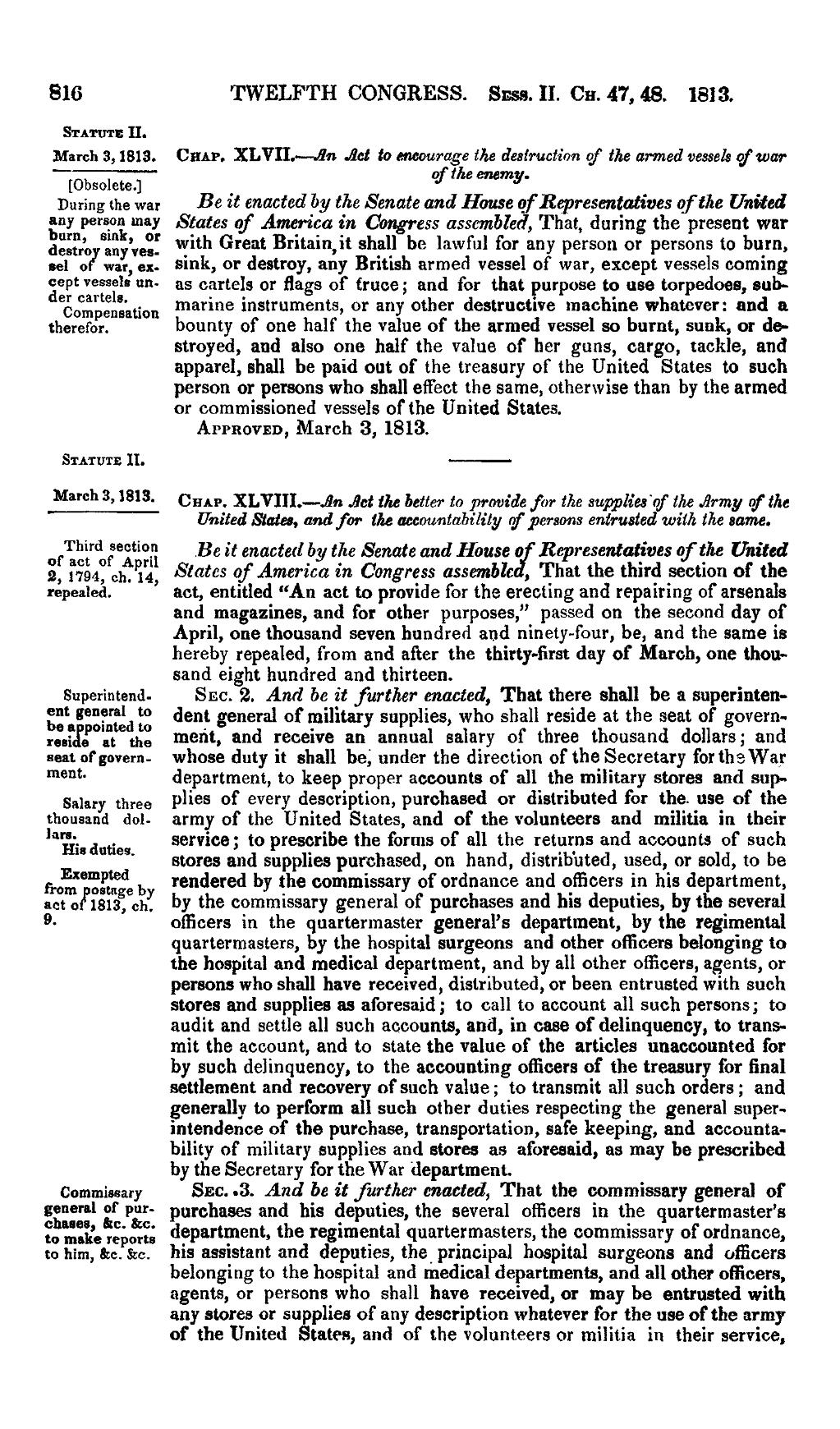Statute ⅠⅠ.
[Obsolete.]
Chap. XLVII.—An Act to encourage the destruction of the armed vessels of war of the enemy.
During the war any person may burn, sink, or destroy any vessel of war, except vessels under cartels.
Compensation therefor.Be it enacted by the Senate and House of Representatives of the United States of America in Congress assembled, That, during the present war with Great Britain, it shall be lawful for any person or persons to burn, sink, or destroy, any British armed vessel of war, except vessels coming as cartels or flags of truce; and for that purpose to use torpedoes, submarine instruments, or any other destructive machine whatever: and a bounty of one half the value of the armed vessel so burnt, sunk, or destroyed, and also one half the value of her guns, cargo, tackle, and apparel, shall be paid out of the treasury of the United States to such person or persons who shall effect the same, otherwise than by the armed or commissioned vessels of the United States.
Approved, March 3, 1813.
Statute ⅠⅠ.
Chap. XLVIII.—An Act the better to provide for the supplies of the Army of the United States, and for the accountability of persons entrusted with the same.
Third section of act of April 2, 1894, ch. 14, repealed.Be it enacted by the Senate and House of Representatives of the United States of America in Congress assembled, That the third section of the act, entitled “An act to provide for the erecting and repairing of arsenals and magazines, and for other purposes,” passed on the second day of April, one thousand seven hundred and ninety-four, be, and the same is hereby repealed, from and after the thirty-first day of March, one thousand eight hundred and thirteen.
Superintendent general to be appointed to reside at the seat of government.
Salary three thousand dollars.
His duties.
Exempted from postage by act of 1813, ch. 9.Sec. 2. And be it further enacted, That there shall be a superintendent general of military supplies, who shall reside at the seat of government, and receive an annual salary of three thousand dollars; and whose duty it shall be, under the Secretary for the War department, to keep proper accounts of all the military stores and supplies of every description, purchased or distributed for the use of the army of the United States, and of volunteers and militia in their service; to prescribe the forms of all the returns and accounts of such stores and supplies purchased, on hand, distributed, used, or sold, to be rendered by the commissary of ordnance and officers in his department, by the commissary general of purchases and his deputies, by the several officers in the quartermaster general’s department, by the regimental quartermasters, by the hospital surgeons and other officers belonging to the hospital and medical department, and by all other officers, agents, or persons who shall have received, distributed, or been entrusted with such stores and supplies as aforesaid; to call to account all such persons; to audit and settle all such accounts, and, in case of delinquency, to transmit the account, and to state the value of the articles unaccounted for by such delinquency, to the accounting officers of the treasury for final settlement and recovery of such value; to transmit all such orders; and generally to perform all such other duties respecting the general superintendence of the purchase, transportation, safe keeping, and accountability of military supplies and stores as aforesaid, as may be prescribed by the Secretary of the War department.
